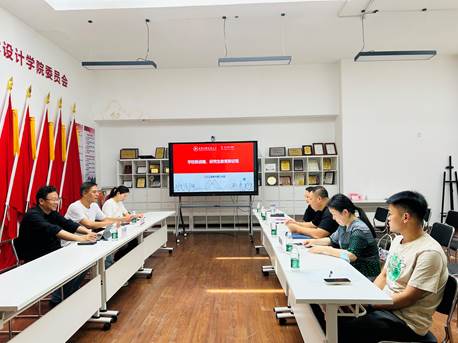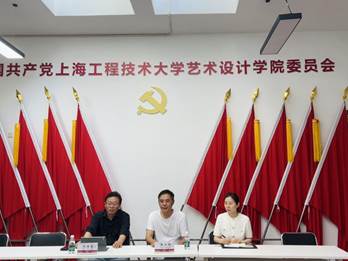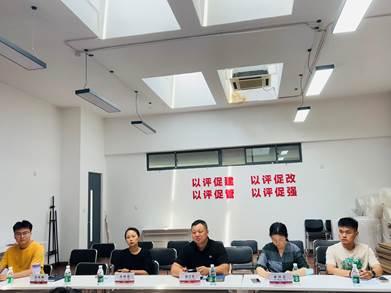To actively respond to the school-running philosophy put forward by President Lou Yongqi and further promote the reform of graduate education, the Graduate School organized a themed seminar on "New School Strategy, New Journey of Graduate Education" in the School of Art and Design on the afternoon of June 20, 2025. The seminar was chaired by Vice Dean Xu Jianghua, with participants including He Yuelei, Vice Dean of the Graduate School; Chen Xingjie, Vice Dean of the Graduate School; Zhang Cuicui, Section Chief of the Training Office; Zhu Mingjie from the Industrial Design Department; Cai Mengya, Deputy Director of the Graduate Department (two teacher representatives); and two student representatives. In-depth discussions were held around issues such as the graduate training mechanism, interdisciplinary cooperation, and curriculum optimization.

Vice Dean He Yuelei spoke first, pointing out that the university is currently in a critical period of implementing its new development strategy, and the reform of graduate education is imperative. He hoped that teachers and students of the School of Art and Design would put forward suggestions and ideas, pool their wisdom, and build consensus.

In his speech, Vice Dean Xu Jianghua emphasized that graduate training should be based on interdisciplinary integration, and put forward three core tasks: first, to build an interdisciplinary design research institute and improve the graduate training mechanism; second, to strengthen the connection of industry-university-research projects and enhance practical capabilities; third, to strengthen education in design thinking and cultural management, so as to cultivate interdisciplinary talents. He pointed out that the current development of design discipline needs to break traditional boundaries, integrate resources from engineering, management and other fields, and practice the "tri-rotor" school-running paradigm.

From the perspective of teaching practice, Teacher Zhu Mingjie pointed out that the existing curriculum system has not fully reflected the characteristics of interdisciplinary integration, and the insufficient faculty has restricted the offering of engineering and management courses. She suggested implementing an "inter-college joint training" model and optimizing the training program according to the learning characteristics of postgraduates: "First-year postgraduates should consolidate their academic foundation, and second-year postgraduates should enter research projects in advance through research groups to avoid the phenomenon of 'idleness in the second year'." In addition, she specifically mentioned the differentiated needs in the training of international students, calling for the formulation of more stringent yet flexible management measures.
Teacher Cai Mengya added that with the expansion of the master's program in Industrial Design Engineering, the contradiction between curriculum pressure and faculty shortage has become prominent, especially the problem of "resource waste" in international student classes. She suggested improving efficiency through small-class teaching and supplementary online resources.
From the perspective of training, Teacher Zhang Cuicui stated that through such democratic discussions, we should truly identify the bottlenecks restricting the improvement of graduate education quality and work together with the college to explore breakthroughs.
Graduate representatives, based on their own experiences, expressed an urgent need for interdisciplinary courses. One student shared, "In corporate practice, multi-professional team collaboration has become the norm, and modular courses can effectively enhance comprehensive capabilities." Another student suggested adding inter-college workshops or innovation spaces to provide more cooperative practice opportunities for graduate students.
In response to the issues raised by students, such as "curriculum customization" and "enhancement of learning motivation," participating teachers had a lively discussion. Teacher He Yuelei proposed that personalized needs could be met by flexibly adjusting training programs and integrating online resources with offline workshops. Vice Dean Xu Jianghua further put forward the idea of "AI empowering education," such as building a shared server to support remote collaboration.

